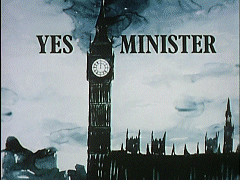Yes, Prime Minister
| Yes Minister Yes, Prime Minister |
|
|---|---|

The title card of Yes Minister
|
|
| Genre |
Political satire British sitcom |
| Created by |
Antony Jay Jonathan Lynn |
| Starring |
Original cast
Revival cast
|
| Theme music composer | Ronnie Hazlehurst |
| Country of origin | United Kingdom |
| Original language(s) | English |
| No. of series | 3 |
| No. of episodes | 21 + 2 specials (original run, sequel Yes Prime Minister and the 2013 revival of the latter=45) (list of episodes) |
| Production | |
| Producer(s) | Stuart Allen Sydney Lotterby Peter Whitmore |
| Camera setup | Multi-camera |
| Running time | 30 minutes (with a one-hour-long Christmas episode and several short specials) |
| Release | |
| Original network |
BBC 2 Gold (revival) |
| Picture format | 576i (SDTV) |
| Original release | 25 February 1980 – 28 January 1988 2013 revived series: 15 January 2013 – 19 February 2013 |
| Website | |
Yes Minister is a satirical British sitcom written by Sir Antony Jay and Jonathan Lynn that was first transmitted by BBC Television between 1980 and 1984, split over three seven-episode series. The sequel, Yes, Prime Minister, ran from 1986 to 1988. In total there were 38 episodes, of which all but one lasted half an hour, each episode ending with the title of the series as an answer to any question posed by Hacker. Several episodes were adapted for BBC Radio, and a stage play was produced in 2010, the latter leading to a new television series on UKTV Gold in 2013.
Set principally in the private office of a British Cabinet minister in the fictional Department of Administrative Affairs in Whitehall, Yes Minister follows the ministerial career of the Rt Hon Jim Hacker MP, played by Paul Eddington. His various struggles to formulate and enact legislation or effect departmental changes are opposed by the British Civil Service, in particular his Permanent Secretary, Sir Humphrey Appleby, played by Sir Nigel Hawthorne. His Principal Private Secretary Bernard Woolley, played by Derek Fowlds, is usually caught between the two. The sequel, Yes, Prime Minister, continued with the same cast and followed the events of the premiership of Jim Hacker after his unexpected elevation to Number 10 upon the resignation of the previous Prime Minister.
The series received a number of awards, including several BAFTAs and in 2004 was voted sixth in the Britain's Best Sitcom poll. It was the favourite television programme of the then Prime Minister of the United Kingdom, Margaret Thatcher.
...
Wikipedia
